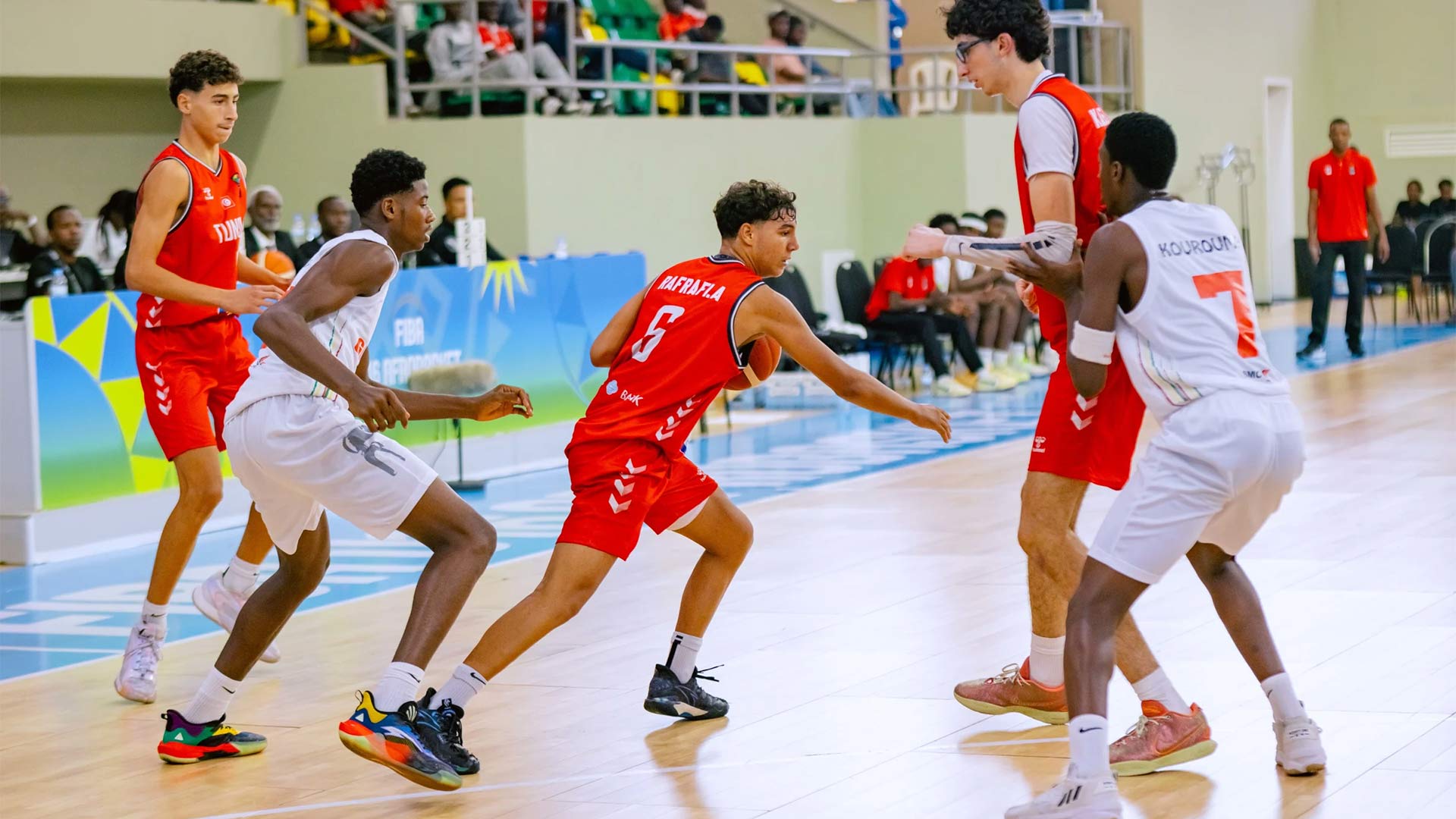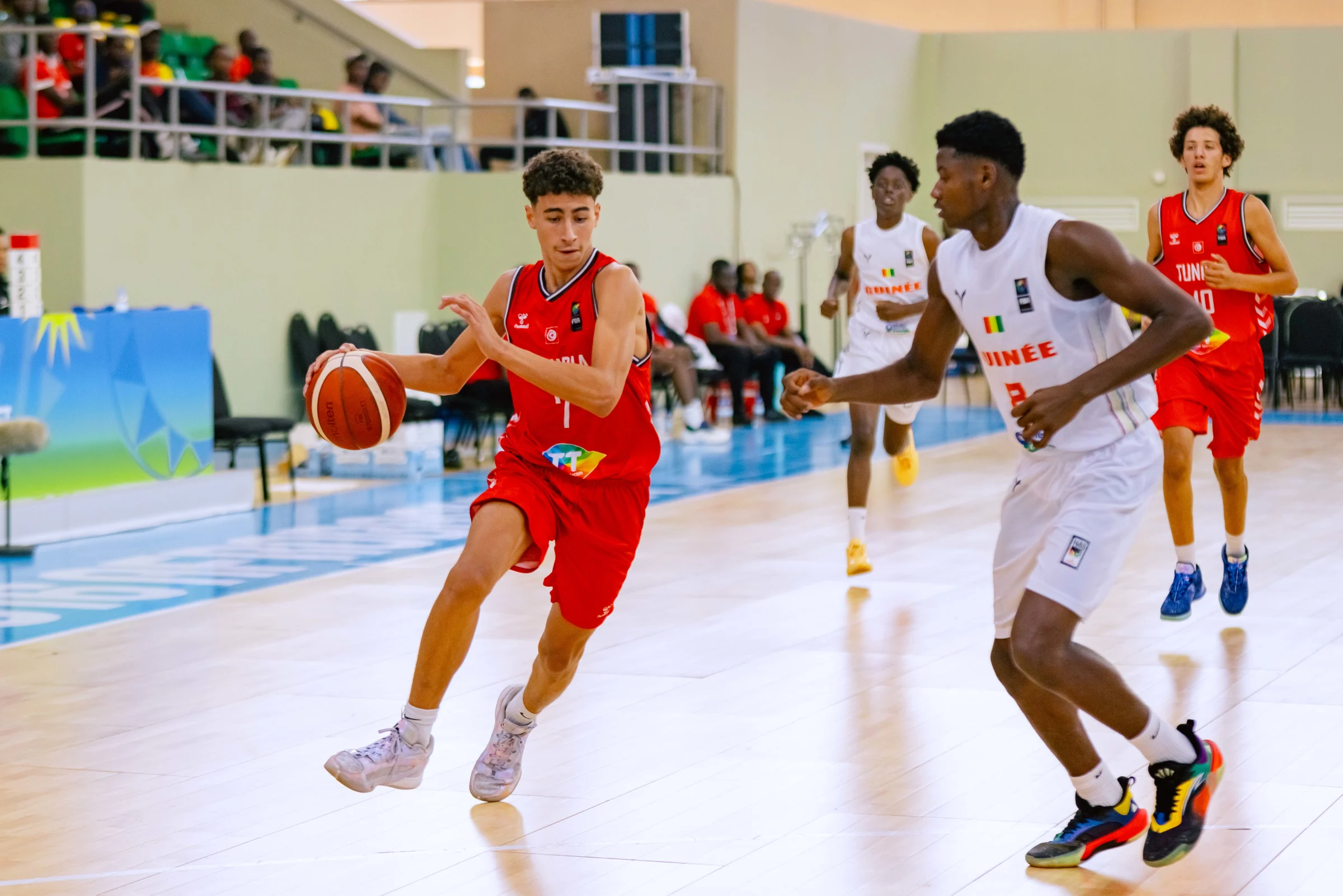Tunisia outclassed Guinea 64–46 in their U16 Afrobasket Group B clash in Kigali. Adem Rafrafi’s brilliant 29-point display powered the North Africans, whose disciplined defense and balanced execution left Guinea struggling for rhythm despite Alpha Ousmane’s resilient double-figure effort.
Last Updated on
September 9, 2025


The 2025 FIBA U16 African Championship continued in Kigali with a decisive Group B battle between Tunisia and Guinea. Coming into the encounter, both sides were eager to secure momentum in the early stages of the tournament, but Tunisia’s balanced execution and the brilliance of Adem Rafrafi proved too much for Guinea to handle. The North Africans claimed a convincing 64–46 win, underscoring their intent to make a deep run in this year’s competition.
From the opening tip, Tunisia displayed purpose and cohesion. Their defensive shape forced Guinea into rushed decisions, while their quick transitions gave them scoring opportunities in open space. The difference-maker, however, was undeniably Adem Rafrafi.
Named MVP of the 2024 FIBA Regional Youth Camp in Douala, Rafrafi lived up to his growing reputation with a scintillating offensive performance. He tallied 29 points, nearly half of his team’s total, combining sharp shooting, confident drives, and composed finishes in traffic. His ability to score in multiple ways left Guinea scrambling for solutions that never quite arrived.
Guinea, meanwhile, struggled to generate rhythm offensively. Despite showing resilience and flashes of promise, their attack leaned heavily on Alpha Ousmane, who registered 10 points and nine rebounds. He was the only Guinean player to reach double figures, underlining the challenge they faced in breaking down Tunisia’s disciplined defense. While Ousmane battled valiantly inside the paint, often against multiple defenders, he lacked consistent support from his teammates. Tunisia’s well-organized rotations closed passing lanes and limited Guinea to contested shots.
By halftime, Tunisia had established a comfortable lead, thanks in part to Rafrafi’s hot hand and the team’s ability to capitalize on Guinea’s turnovers. The Tunisians punished every lapse, turning defense into offense with crisp ball movement and intelligent spacing. Guinea attempted to adjust in the third quarter, applying more pressure on the perimeter and slowing the pace of the game. However, Tunisia remained patient, using screens to free Rafrafi and spreading the floor to create mismatches.
One of the most striking aspects of Tunisia’s performance was their composure. Even when Guinea briefly cut the deficit to single digits, Tunisia never looked rattled. They controlled the tempo, avoided unnecessary fouls, and stayed focused on executing their game plan. Their 22-point margin of victory reflected not only Rafrafi’s individual brilliance but also the collective discipline instilled in the squad.

For Guinea, the loss highlighted both areas of concern and opportunities for growth. While Ousmane proved a reliable presence, the lack of secondary scoring options hindered their chances of mounting a comeback. Too often, possessions ended with forced shots late in the clock, a testament to Tunisia’s suffocating defensive pressure. Yet, despite the scoreline, Guinea demonstrated hustle and determination, qualities they will need to build upon as Group B action progresses.
As for Tunisia, this win sends a clear message to the rest of the competition. Rafrafi’s 29 points will understandably dominate the headlines, but the supporting cast deserves recognition as well. Tunisia’s rebounding, perimeter defense, and transition play were all executed with maturity beyond their years. Such a well-rounded performance bodes well for their campaign, especially as the level of opposition intensifies in the knockout rounds.
The Kigali crowd, energized by the fast-paced action, witnessed a showcase of talent that reflects the bright future of African basketball. The U16 Afrobasket is designed to spotlight emerging stars, and Rafrafi seized the stage with authority. His ability to lead, score, and inspire his teammates demonstrated why he is considered one of the most promising prospects on the continent.
Ultimately, Tunisia’s 64–46 triumph over Guinea was more than just a group-stage win; it was a statement of intent. With Rafrafi in commanding form and a team that looks increasingly cohesive, Tunisia has positioned itself as a contender to watch. Guinea, on the other hand, will need to regroup quickly, finding ways to diversify their offense and relieve the burden on Ousmane if they are to remain competitive.
The tournament is still young, but this encounter provided a glimpse of both promise and reality: Tunisia’s talent and structure are formidable, while Guinea must dig deeper to translate their potential into results.
[Photography Courtesy of FIBA]